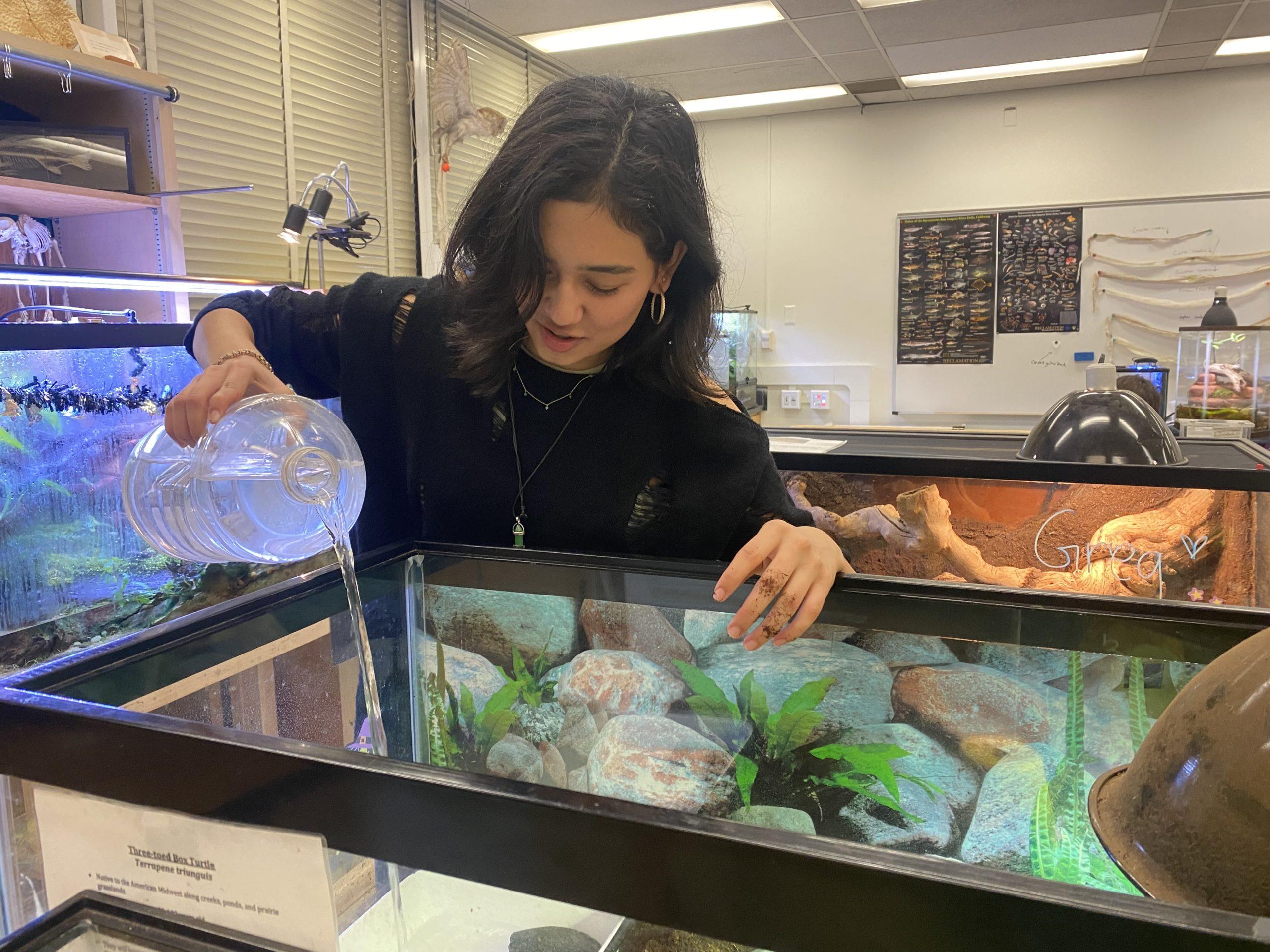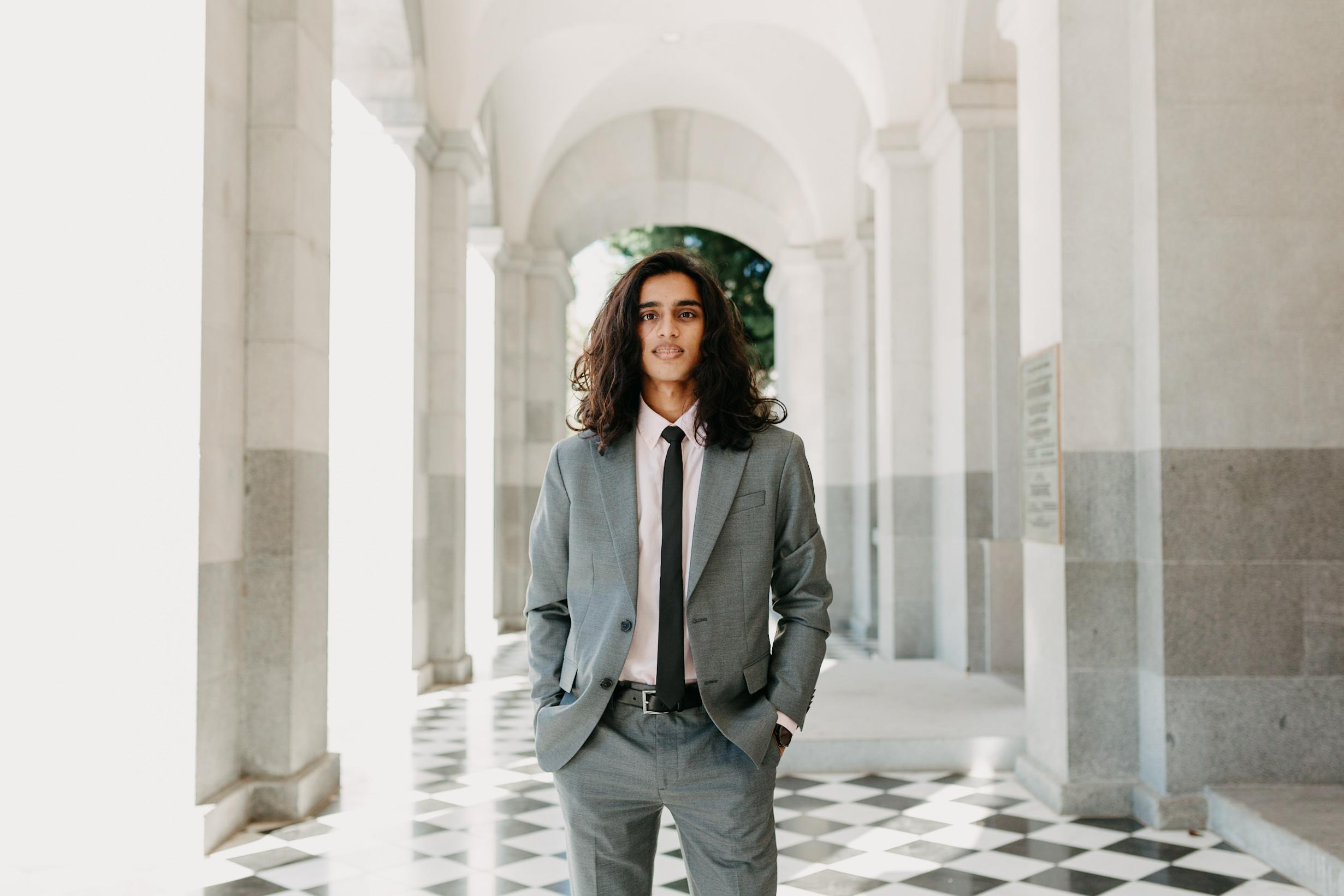Whether their job is to help feed a bearded dragon or study dozens of fruit flies, three SCDS seniors are starting their internships at California State University, Sacramento.
These three seniors are Shakhzoda Khodjakhonova, Ibrahim MoheyEldin and Grace Eberhart.
Khodjakhonova interns in CSUS Vivarium management and animal care under Samuel Curtis, who runs the CSUS Vivarium. Khodjakhonova spends her time feeding and caring for some of the more than 30 species of reptiles, amphibians and vertebrates. The school uses the animals to enrich curriculum and participate in outreach activities, according to the CSUS Field Biology Group website.
“Mondays, Wednesdays and Fridays are our main animal care days,” Khodjakhonova said. “I get everyone their food and refill their water. Sometimes I have to shove the earthworms down the frogs’ throats to get them to eat them.”
MoheyEldin and Eberhart are interning in the biology lab, researching the effects of aging by studying fruit flies under the tutelage of Johannes Bauer, assistant professor of chemistry.
MoheyEldin and Eberhart both analyze the fruit fly, Drosophila melanogaster.
“Work in fruit flies was instrumental in elucidating the principles of modern genetics and developmental biology,” according to Bauer’s CSUS faculty website profile.
“Right now, I’m analyzing the data that they’ve accumulated over a period of time, and then we’re going to figure out conclusions from that data,” Eberhart said.
The scientists are studying flies with a mutation that increases aggression. They want to see if that mutation leads to an increased rate of aging, especially in relation to social environment and behavior, Eberhart said.
“We look at how fruit flies age, and we work with fruit flies because they have a short lifespan. We can get the results of how breed and gender affect the fly’s lifespan quicker this way,” Eberhart said. “We’re also testing the sociability of flies and how they interact with each other.”
For the past two years, CSUS interns have had to be fully remote due to COVID-19. The internship program began in 2016 when SCDS student interns paired with CSUS professors to assist them with their research.
Typically, four students intern each year, each with one of the four CSUS professors. However, this year, there is one less position available due to associate professor Michael Wright’s sabbatical.
To apply, students must have completed biology. If selected, they will complete a for-credit internship under a professor in either a lab or the CSUS Vivarium. Interns begin in July and end in May of the following year.
Whited and Robin Altman, an associate professor in biological sciences, lead the internship program.
Whited coordinates with the interning students and with CSUS, while Altman handles the safety paperwork and helps keep the program running smoothly.
The two first met when Altman was a long-term substitute teacher for Whited when she was on maternity leave. This marked the beginning of a friendship between the two.
When the two decided to create the program, they had two goals.
“The first goal was to provide opportunities for high school students to experience research and an academic environment earlier in their educational journey than typically possible, and the second goal was to strengthen collaborative ties between our two academic institutions,” Altman said.
The program is a rare opportunity for students at the high school level, Whited said.
“I always will sit down with students and have a discussion with them about why they’re interested in it and make sure they understand the scheduling demands,” Whited said.
In some cases, when students do not reach out first, Whited finds students she thinks will be a good fit for the program. This is how MoheyEldin and Eberhart were introduced to the program.
“It just sounded really interesting. Last year during one of the Leadership Lunches, Sanjana Anand, who interned last year, was talking about it,” Eberhart said. “I thought it would be something cool to try out in high school before going off to college, so when Whited reached out, I accepted.”
Senior Khodjakhonova, however, was introduced through an interview with Vivian Conner, ’22, who interned at the CSUS Vivarium last year.
“For my AP English Language and Composition class, we had to interview someone for an essay. It started from that, and I went into the vivarium to write Vivian’s profile, and she showed me around,” Khodjakhonova said. When Whited later sent out an email a few months later about the internship, Khodjakhonova decided to enter the program.
The internship, while an exciting opportunity, is difficult to manage with high school classes and extracurriculars.
For example, Khodjakhonova had to choose between AP Computer Science A and AP Art History in order to have enough time for the internship.
“It’s a lot to handle,” she said. “I have to have two free periods stacked just to be able to have enough time to go to the vivarium.”
But, she said, it was worth it since she gets to work with incredible people and gain skills that will be essential in college.
MoheyEldin is also glad he became an intern.
“I get to work in a lab environment prior to college and get that class experience,” he said. “I would recommend it to anyone who would also like to work in a lab environment and try out research.”
Overall, the new interns participating this year are fabulous, Altman said.
“Many of the restrictions that were in place previously during the pandemic have relaxed this year,” Altman said. “This puts us in the great position of largely returning to pre-pandemic procedures. It’s really nice because it feels more ‘normal’ again this year!”
Whited said the professors were amazing considering the internships had to be fully remote in 2020-2021 and had restrictions in 2021-2022.
“They all figured out how to make it remote and how to make it a meaningful experience for the students,” she said. “I’m so grateful to them because this is 100% volunteer work. They all do this because they really believe in training the next generation of research scientists and getting students excited about research.”
— By Emily Cook
Originally published in the Oct. 25 edition of The Octagon


